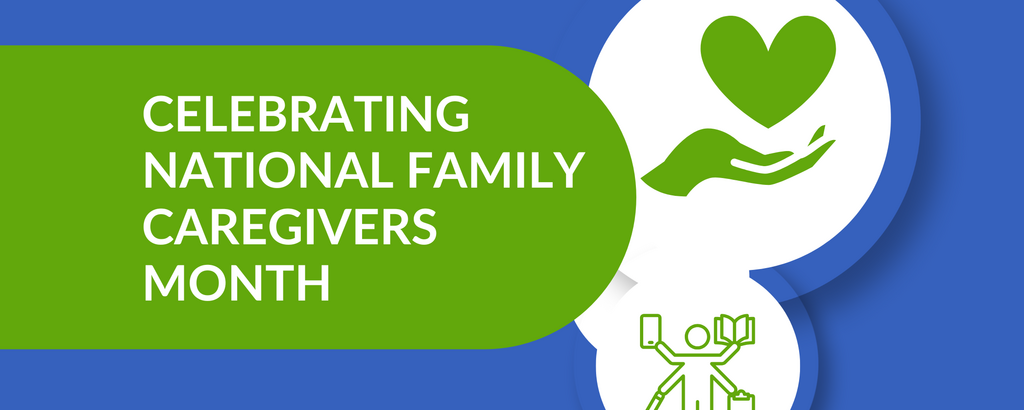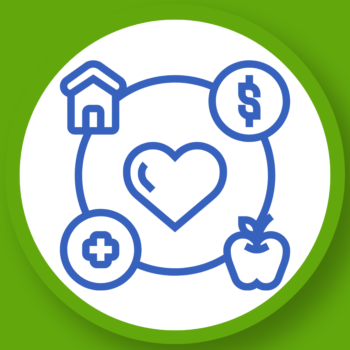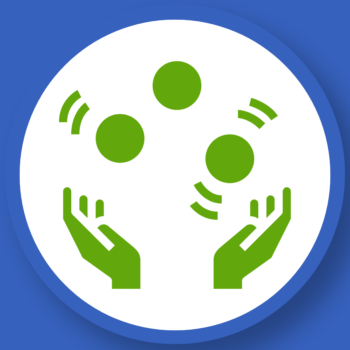
Caregiver Reflections and Connecting with Support
In honor of National Family Caregivers Month, real caregivers share their experience and how they’ve found support. Their reflections are below.
Caregiving is difficult and critical work. To find support as a family caregiver, connect with Our Caregiver Resource Center today at 847−524−8800 ext. 124 or learn more here.
Honoring Caregivers

In honoring caregivers, I admit it has taken me a long time to come to terms with being one. Like most caregivers who are supporting a loved one, we have had other lives and careers that have provided lifelong journeys with twists and turns that led to purposeful and fulfilling lives. Then in the blink of an eye or the dawning realization, life is subtly or dramatically different.
I remember the first time a healthcare worker asked me if I was my spouse’s caregiver, I said “No, I’m his wife.” It was the first time it occurred to me that yes, I was his caregiver, too.
Like many, my situation is a very slow progression that has crept up on me; one that I have spent a great deal of time shifting among denial, hopefulness, anger, gratefulness, and frustration. With a registered nursing background, I did not see myself forced into the nursing role at home once I left the hospital setting. Yet, this is where I find myself. I am constantly shifting my identity from wife to caregiver and back. This is a battle I undertake nearly every day.
I am at once grateful for my nursing and healthcare background and also find it a bit of a curse. I believe I know intuitively what to worry about and what signs and symptoms to let go for now. I also spend an extraordinary amount of time worrying about what might happen next. Waiting for the other shoe to drop and letting real time life go by without a thought for today and what joy is to be found. I think caregivers tend to live in a state of anticipatory worry or grief. What is going to happen next, because we know it will be something unexpected.
Caregiving is hard work; physically and emotionally. Caregivers are the unsung heroes who are rarely off duty and can always tell you what else they have to do before they fall exhausted into bed at night. Caregivers are the ones holding the family together with the blood, sweat, and tears; they live in the background picking up and putting away the discarded troubles of the day. While it was not my choice to do this role, I know I am essential and loved for the role that I provide. I am sure other caregivers feel much the same way I do.
- Janice Noble, Ph.D.
Connecting with KYC
When my husband and I moved back to Illinois last year, we needed resources to assist in my husband’s care. I was so appreciative and delighted to discover Kenneth Young Center. KYC provided all the necessary resources I desperately needed. Their knowledge and information have been invaluable and set me on a course that today has proved critical to my husband and I. KYC’s caregiving program also arranged and continues to support my husband’s attendance in A Caring Place with funds they distribute from the AgeOptions through the Older Americans Act.
During our interaction, our Caregiver Specialist shared with me about a Respite Care Program called A Caring Place. This program has proven to be the highlight of my husband’s week and a wonderful opportunity for me to regenerate. The staff and volunteers truly live up to their name as they provide valuable activities and support for those in their care as well as checking in regularly with the participants’ significant others.
Once per month my husband and I have the privilege to attend KYC’s Memory Café. It is always a fun experience that includes lunch and a delightful program. We look forward to the event and the ability to meet friends and socialize as a couple over lunch.
I thank KYC for all the support they provide the community and most specifically the senior population in our area.
- Janice Noble, Ph.D.
From Career Caregiver to Family Caregiver

My name is Jodette Szafran, and by profession, I am a Companion Care Giver. For 10 years I worked for an agency. In 2024 I required a serious surgical procedure and depended on my mom to help me recuperate at her home. During my recuperation we learned mom was diagnosed with cancer. Since I was on medical leave of absence from my agency, I made a decision to step in and help take care of mom. I knew I had the training to be a caregiver and wanted to do what I could.
Although it was a difficult financial decision, I was willing to suspend my financial obligations and mom and I made arrangements. Over the next several weeks I literally moved back home to be with mom 24⁄7.
While I had the caregiving background and training, I didn’t realize how much more it is to care for a family member. When caregiving for a client, you have to be able to have compassion, kindness and respect for their dignity. When caring for a family member, there’s a different level of concern that shows up. I realized mom’s outcome was the most important thing. I love my mom. She’s always been a very strong, resilient, independent, overly loving, caring woman. She has always been my rock, my cheerleader, my inspiration, and there’s more love in my heart than I could ever explain.
Chemo has knocked her down a lot. She is weak most of the time and has gone through so many challenges. Always a happy fun lady, she’s struggling to stay positive and inspired every day. I’m at her side most of the day to make sure she’s getting the best care possible. I struggle as a daughter who just wants to see mom through this challenge. Having lost a wonderful father during COVID-19, I can’t bear the thought of losing the most wonderful woman in my life. So I keep going, checking everything mom needs to make sure she can get through her journey. Sometimes it’s just telling her it’s going to be alright, sometimes saying comforting, inspirational phrases, most of the time it’s just holding her hand or sitting next to her just to be together.
Through this journey I have realized the difference between being a caregiver for a client and caring for someone you love with all your heart. Only special people have the necessary skill and compassion to be a caregiver. But a bond between a family member is on a whole other level.
Around the clock caregiving has more challenges than a shift with a client. For me, it’s just what we need as a family to see mom through her dark days and daily challenges. I would gladly do this, and am proud that I have the ability, skill, and knowledge to be with her when she needs me the most.
My mom was fortunate to get assistance from Kenneth Young Center. Although an experienced caregiver, I was unaware of the services residents could get from such an agency. While the Home Delivered Meals were helpful with nutrition needs, other services benefited mom. But for me, I became aware of support groups designed specifically for caregivers. I learned others were dealing with obstacles and challenges in their caregiving roles. I learned there was somewhere where I could voice my own difficulties caring for a loved one. I learned there were others who would give me the support I needed. There are always frustrations dealing with loved ones but you must never lay your problems on their shoulders. They are going through much more than anyone can endure sometimes. No need to cause more aggravation. So the support group became my outlet, my place to have a voice, a place where others totally understood what I was going through. I am very glad to have the support of Kenneth Young Center’s Caregiver Support Group.
I celebrate all caregivers for the compassion, strength, skill, and training needed for this special career. Congrats to all who are in this profession. There’s a special place in heaven for these caregivers who have given sympathy, hope, kindness to those in their care.
Caregiving as a 24 Hour Responsibility

Caregiving is an incredibly challenging journey, and in most instances, you feel under-appreciated on a daily basis. You give up having your own individual life, put goals and relationships on the back burner, so you can prioritize and focus on your loved one. This is a 24×7 job, you seldom do something for yourself and only individuals who are in the same position can even relate.
However, I know this won’t always be the situation and I will never regret taking care of my mother. This commitment demonstrates unconditional love like no other and I choose to look at it as a benefit that I can do this for her, as I know the sacrifices she made for me throughout her life.
For me, taking advantage of various Kenneth Young Center offerings, I’ve been able to gain the tools I need to take care of not only my mom, but my well being. I’m incredibly grateful to work with an experienced social worker who understands what this commitment entails and the trials and tribulations that come with it. Our monthly Memory Café event offers a fun outing for our loved ones where they can socialize and enjoy some great entertainment and also work on a craft. Meeting and collaborating with two other caregivers who can understand my challenges is a huge benefit of attending the monthly support group too.
Being a caregiver can be emotionally, physically, and mentally exhausting. It’s heartbreaking, sad, scary, lonely, and rewarding at the same time. You lose your personal identity and question on a daily basis if you’re doing the right thing. So if you know a caregiver, give them a break, show some empathy, and acknowledge the remarkable work they are doing. It’s probably the hardest job to help a loved one during their final chapter of their life journey.
-Lisa
Previous Article Next Article

